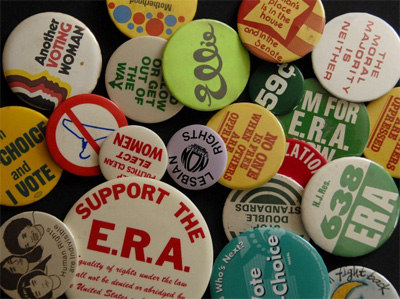The University Museum will host two exhibitions from February 2 through March 15: “In Sisterhood: The Women's Movement in Pittsburgh” and “Bridge Builders." The exhibitions are sponsored by Women's Studies, an interdisciplinary minor at IUP. A public reception will open the exhibitions on February 2 from 6:00 to 8:30 p.m.

“In Sisterhood: The Women's Movement in Pittsburgh” is an oral history and multimedia project designed to promote a deeper understanding and appreciation of the contributions of women of western Pennsylvania to the national women's movement. A related project, “Bridge Builders,” explores the connections between the civil rights and women's movements in Pittsburgh during the 1960s and 1970s. The exhibitions include photographs, ephemera, and a video that document how diverse groups of local grassroots activists successfully brought down barriers to equality and civil rights in the region.
According to Patricia Ulbrich, project director, the goals of both projects are to pay tribute to people who worked hard to promote equality in the region, to raise awareness among students about the role of social movements in a democratic society, and to encourage civic engagement.
In conjunction with the exhibitions, a panel presentation, “In Sisterhood,” will be offered on Monday, Feb. 18, at 6:00 p.m. in the Ohio Room of the Hadley Union Building as part of the Six O'Clock Series at IUP. The presentation is free and open to the public.
The panel will include four women associated with the exhibits:
- Patricia Ulbrich, Ph.D., is director and producer of the video project “In Sisterhood: The Women's Movement in Pittsburgh.” For more than three decades, Ulbrich's research has focused on women's issues, including how individuals' race, class, and gender shape their life chances. She cofounded the Women and Girls Foundation of Southwest Pennsylvania and serves on the board of Pittsburgh Action Against Rape.
- Barbara Hafer was the first educational director of Pittsburgh Action Against Rape, founder of the Center for Victims of Violent Crimes, and the cofounder of the Pennsylvania Coalition Against Rape. Best known for her career in Pennsylvania politics, Hafer was the first woman elected to Allegheny County Board of Commissioners. She was subsequently elected state auditor general and state treasurer. She currently lives in Indiana and has served on the Foundation for IUP board of directors.
- Maureen McHugh, Ph.D., was active in the women's movement in Pittsburgh and has played a leadership role in the development and direction of women's studies in the region, initiating the Women's Studies program at IUP in 1986 and codirecting the Tri-state Teaching Women's Studies Conference for more than a decade. A psychology professor at IUP, she is active in feminist psychology at the national level.
- Ann Begler is founder and principal of the Begler Group, a Pittsburgh firm providing services in mediation and conflict coaching. Begler has dedicated her career to helping people and organizations to strengthen relationships and navigate conflicts. She is an active mediator for the Equal Employment Opportunity Commission's mediation program, the Federal District Court's Alternative Dispute Resolution program in the Western District and the conflict management program sponsored by the Local Government Academy.
The exhibitions and panel presentation are supported by the following IUP bodies: Women's Studies, the University Museum, the President's Commission on the Status of Women, the College of Humanities and Social Sciences, the African American Cultural Center and the departments of Political Science, English, Psychology, History, and Philosophy.
Admission to the exhibitions and public opening reception in the University Museum is free.
For more information, visit the IUP University Museum website or Facebook page, or call the IUP College of Fine Arts at (724) 357-2397.
The University Museum hours are Tuesdays, Wednesdays and Fridays, 2:00–6:30 p.m.; Thursdays, noon–7:30 p.m.; and Saturdays, noon–4:00 p.m. The museum is closed Sundays, Mondays, and university holidays.